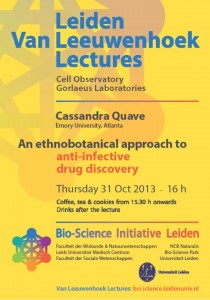 On October 31, 2013, Dr. Quave will visit Leiden University (Leiden, The Netherlands) as a guest of the Leiden BioScience Initiative to give an invited lecture in the van Leeuwenhoek Lecture series on BioScience. Quave will present on research progress being made in her lab and with collaborators in drug discovery initiatives for novel anti-infective therapies. The lecture title and abstract is provided below:
On October 31, 2013, Dr. Quave will visit Leiden University (Leiden, The Netherlands) as a guest of the Leiden BioScience Initiative to give an invited lecture in the van Leeuwenhoek Lecture series on BioScience. Quave will present on research progress being made in her lab and with collaborators in drug discovery initiatives for novel anti-infective therapies. The lecture title and abstract is provided below:
An ethnobotanical approach to anti-infective drug discovery
Rates of multidrug resistant bacterial infections in both the community and healthcare setting are on the rise, making certain drug resistant pathogens a top public health concern. Nevertheless, the number of new antibiotic leads in the pipeline is diminishing, and many scientists have put out a call for the discovery and development of a new class of drugs which could mediate microbial pathogenicity rather than growth and survival. One example of this is the staphylococcal quorum-sensing pathway, controlled by the accessory gene regulator (agr) system, which as a global regulator of staphylococcal virulence. Likewise, other pathogenesis factors such as microbial biofilms, which confer a state of intrinsic resistance in infections, are recognized as high value targets in drug discovery initiatives.
Thus, while the scientific community has established new targets for screening efforts, the question of where to find the best drug candidates remains. Our laboratory takes an ethnobotanical approach to drug discovery. Specifically, we focus our screening efforts on those medicinal plants used in traditional medicine for the treatment of infectious disease. Following extensive studies on the complementary and alternative medical (CAM) practices of southern Italians in the treatment of skin and soft tissue infection, over 100 plant samples have been identified, collected, extracted, and examined for their anti-bacterial potential. In this talk, I will discuss progress made on two of our lead natural product compositions – one of which inhibits biofilms in a number of important drug-resistant pathogens (i.e. Staphylococcus aureus, Streptococcus pneumoniae, and Neisseria gonorrhoeae) and the other that inhibits staphylococcal cross-talk, turning off the production of destructive toxins.
A complete schedule of Dr. Quave’s upcoming speaking engagements can be found here.






